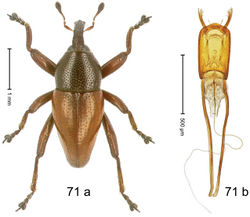Trigonopterus rubiginosus
| Notice: | This page is derived from the original publication listed below, whose author(s) should always be credited. Further contributors may edit and improve the content of this page and, consequently, need to be credited as well (see page history). Any assessment of factual correctness requires a careful review of the original article as well as of subsequent contributions.
If you are uncertain whether your planned contribution is correct or not, we suggest that you use the associated discussion page instead of editing the page directly. This page should be cited as follows (rationale):
Citation formats to copy and paste
BibTeX: @article{Riedel2013ZooKeys280, RIS/ Endnote: TY - JOUR Wikipedia/ Citizendium: <ref name="Riedel2013ZooKeys280">{{Citation See also the citation download page at the journal. |
Ordo: Coleoptera
Familia: Curculionidae
Genus: Trigonopterus
Name
Trigonopterus rubiginosus Riedel sp. n. – Wikispecies link – ZooBank link – Pensoft Profile
Diagnostic description
Holotype, male (Fig. 71a). Length 2.93 mm. Color orange-ferruginous; pronotum, tarsi and antennal club black. Body elongate; with distinct constriction between pronotum and elytron; in profile dorsally flat. Rostrum with distinct median and pair of submedian costae, in apical 1/3 scabrous. Pronotum densely punctate; interspaces subequal to puncture´s diameter. Elytra with striae marked by small punctures and hardly visible fine lines, intervals with smaller punctures interspersed; intervals 1–3 near base with larger and denser punctures. Mesocoxa with densely setose patch. Femora edentate. Profemur in basal third posteriorly with callus. Metafemur dorsally with row of white scales; subapically with indistinct stridulatory patch interspersed with coarse punctures. Metatibia ventrally with sparse row of long setae. Aedeagus (Fig. 71b) apically subangulate, with brushes of stout, apically hooked setae; body flattened, sides subparallel; transfer apparatus simple, spiniform; ductus ejaculatorius without bulbus. Intraspecific variation. Length 2.81–3.09 mm. No female specimen available.
Material examined
Holotype (MZB): ARC1756 (EMBL # HE616033), WEST NEW GUINEA, Jayawijaya Reg., Poga, S03°47.631', E138°35.459' to S03°47.406', E138°35.507', 2260–2410 m, 14-VII-2010. Paratypes (ARC, SMNK, ZSM): WEST NEW GUINEA, Jayawijaya Reg.: 13 exx, ARC1736 (EMBL # HE616013), ARC1737 (EMBL # HE616014), ARC1738 (EMBL # HE616015), Poga, S03°48.382', E138°34.780', 2285–2345 m, 13-VII-2010; 1 ex (marked as “ARC0033”), Jiwika, 1800–2300 m, 31-V-1998; 1 ex, Ilugwa, Melanggama, 1900–2200 m, 09-12-IX-1990.
Distribution
Jayawijaya Reg. (Jiwika, Ilugwa, Poga). Elevation: 2200–2285 m.
Biology
Beaten from foliage of montane forests.
Etymology
This epithet is based on the Latin adjective rubiginosus (rusty-red)
Notes
Trigonopterus rubiginosus Riedel, sp. n. was coded as “Trigonopterus sp. 248” by Tänzler et al. (2012)[1].
Original Description
- Riedel, A; Sagata, K; Surbakti, S; Rene Tänzler, ; Michael Balke, ; 2013: One hundred and one new species of Trigonopterus weevils from New Guinea ZooKeys, 280: 1-150. doi
Other References
- ↑ Tänzler R, Sagata K, Surbakti S, Balke M, Riedel A (2012) DNA barcoding for community ecology - how to tackle a hyperdiverse, mostly undescribed Melanesian fauna. PLoS ONE 7 (1): e28832. doi: 10.1371/journal.pone.0028832
Images
|
